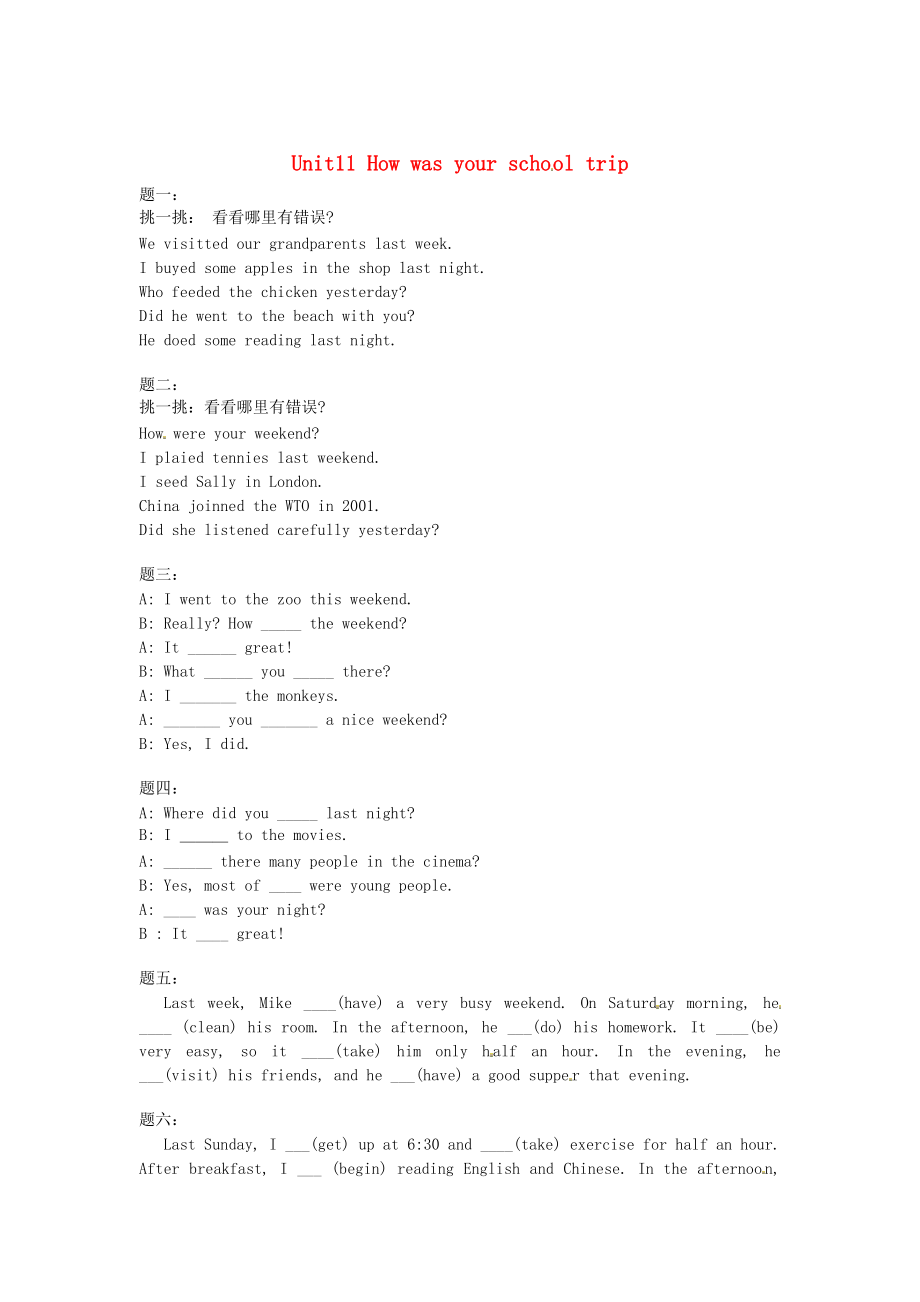《【人教版】七年級(jí)下冊(cè):Unit 11 How was your school trip課后練習(xí)含解析》由會(huì)員分享���,可在線(xiàn)閱讀��,更多相關(guān)《【人教版】七年級(jí)下冊(cè):Unit 11 How was your school trip課后練習(xí)含解析(3頁(yè)珍藏版)》請(qǐng)?jiān)谘b配圖網(wǎng)上搜索���。
1、 精品資料
Unit11 How was your school trip
題一:
挑一挑: 看看哪里有錯(cuò)誤?
We visitted our grandparents last week.
I buyed some apples in the shop last night.
Who feeded the chicken yesterday?
Did he went to the beach with you?
He doed some reading last night.
題二:
挑一挑:看看哪里有錯(cuò)誤?
2�����、
How were your weekend?
I plaied tennies last weekend.
I seed Sally in London.
China joinned the WTO in 2001.
Did she listened carefully yesterday?
題三:
A: I went to the zoo this weekend.
B: Really? How _____ the weekend?
A: It ______ great!
B: What ______ you _____ there?
A: I _______ t
3����、he monkeys.
A: _______ you _______ a nice weekend?
B: Yes, I did.
題四:
A: Where did you _____ last night?
B: I ___ to the movies.
A: ______ there many people in the cinema?
B: Yes, most of ____ were young people.
A: ____ was your night?
B : It ____ great!
題五:
Last week, Mike ____(hav
4、e) a very busy weekend. On Saturday morning, he ____ (clean) his room. In the afternoon, he ___(do) his homework. It ____(be) very easy, so it ____(take) him only half an hour. In the evening, he ___(visit) his friends, and he ___(have) a good supper that evening.
題六:
Last Sunday, I ___(get) up
5���、 at 6:30 and ____(take) exercise for half an hour. After breakfast, I ___ (begin) reading English and Chinese. In the afternoon, I ____(go) swimming. In the evening, I ___(watch) TV. I ____(have) a good time.
Unit11 How was your school trip
課后練習(xí)參考答案
題一:
visitted改為visited; buyed改為bought; feed
6�、ed改為fed; went改為go; doed改為did.
解析:
1. 根據(jù)時(shí)間狀語(yǔ)last week可知為一般過(guò)去時(shí)�,visit的過(guò)去式為visited.
2. 根據(jù)時(shí)間狀語(yǔ)last night可知為一般過(guò)去時(shí),buy的過(guò)去式為bought.
3. 根據(jù)時(shí)間狀語(yǔ)yesterday可知為一般過(guò)去時(shí),feed的過(guò)去式為fed.
4. 實(shí)義動(dòng)詞的一般過(guò)去時(shí)的一般疑問(wèn)句中動(dòng)詞用原形���。went需要改為go.
5. 根據(jù)時(shí)間狀語(yǔ)last night可知為一般過(guò)去時(shí)�����,do的過(guò)去式為did.
題二:
were改為was; plaied改為played; seed改為saw; joinne
7�、d改為joined; listened改為listen
解析:
1. your weekend為單數(shù)����,were需要改為was.
2. 根據(jù)時(shí)間狀語(yǔ)last weekend可知為一般過(guò)去時(shí),plaid的過(guò)去式為played.
3. see的過(guò)去式為saw.
4. join的過(guò)去式為joined.
5. 實(shí)義動(dòng)詞的一般過(guò)去時(shí)的一般疑問(wèn)句中動(dòng)詞用原形�����。listened需要改為listen.
題三:
was; was; did; do; fed; Did; have
解析:
1. 根據(jù)went可知為一般過(guò)去時(shí)��,因此用was, 句意為“周末過(guò)得怎么樣�?”���。
2. It was g
8�����、reat!太棒了����。
3. 實(shí)義動(dòng)詞的一般過(guò)去時(shí)的一般疑問(wèn)句要借助助動(dòng)詞did, 后面動(dòng)詞用原形。
4. fed the monkeys喂猴子����。
5. 實(shí)義動(dòng)詞的一般過(guò)去時(shí)的一般疑問(wèn)句要借助助動(dòng)詞did, 后面動(dòng)詞用原形。
題四:
go; went; Were; them; How; was
解析:
1. 實(shí)義動(dòng)詞的一般過(guò)去時(shí)的一般疑問(wèn)句要借助助動(dòng)詞did, 后面動(dòng)詞用原形��。
2. 根據(jù)上句的時(shí)間狀語(yǔ)last night可知此處用一般過(guò)去時(shí)��。
3. 根據(jù)many people可知��。
4. 此處需要填人稱(chēng)代詞的賓格形式���。
5. How用來(lái)詢(xún)問(wèn)“怎么樣”��。
6. It wa
9����、s great!太棒了�。
題五:
had; cleaned; did; was; took; visited; had
解析:
1. 由時(shí)間狀語(yǔ)last week可知用一般過(guò)去時(shí)。句意為“麥克周末很忙”�����。
2. 句意為“在周六早上,他打掃了房間”�。
3. 句意為“下午,他做作業(yè)”��。
4. 句意為“作業(yè)很簡(jiǎn)單�����,只花了他半小時(shí)時(shí)間”�。
5. 句意為“晚上,他去拜訪(fǎng)了朋友并在那吃了晚飯”���。
題六:
got; took; began; went; watched; had
1. 由時(shí)間狀語(yǔ)last Sunday可知用一般過(guò)去時(shí)�。句意為“上周日我6點(diǎn)半起床��,鍛煉了半小時(shí)”���。
2. 句意為“早飯后����,我開(kāi)始讀英語(yǔ)和中文”��。
3. 句意為“下午我去游泳”���。
4. 句意為“晚上���,我看了電視”。
5. 句意為“我過(guò)得很愉快”�。
 【人教版】七年級(jí)下冊(cè):Unit 11 How was your school trip課后練習(xí)含解析
【人教版】七年級(jí)下冊(cè):Unit 11 How was your school trip課后練習(xí)含解析

